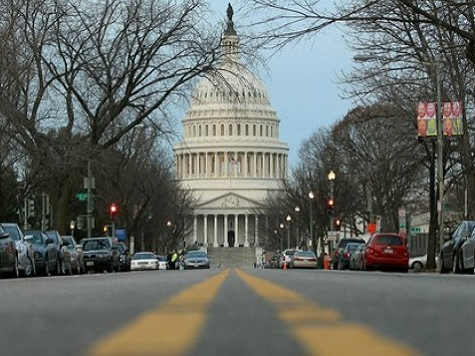As the vote to authorize a U.S. attack on Syria nears this week, President Barack Obama is preparing to grant six interviews on Monday, and to address the nation on Tuesday. But the opposition is growing in strength and has the upper hand. The debate itself, brought about by Obama’s decision first to ignore Congress, then to reverse himself, has already damaged his stature. A “no” vote will have even more far-reaching effects.
One effect will be to punish Obama for once leading the anti-war movement as U.S. troops were fighting difficult battles in Iraq. After all, Congress will merely be holding him to the standard he set for his predecessor–that the U.S. should not defy the UN or the international community, and that the president should not order an attack absent “an actual or imminent threat.” It is only just that Obama be hoisted by his own petard.
Another effect will be to curtail the runaway executive powers of the Obama presidency–again by holding him to the limits he laid down in criticizing the executive overreach of his predecessor. Obama has since far exceeded the Bush excess, often vowing to go around Congress, openly defying existing law in the case of immigration and Obamacare. For him to lose a war vote would be the ultimate rebuke and would, finally, set a boundary.
Yet another effect would probably be to damage the credibility of the president’s warnings about a “red line” on chemical weapons. Yet these were already fatally damaged by Obama’s inaction after previous allegations of chemical weapons use in the conflict. Pro-Israel groups are rallying to Obama’s side on Syria, fearful of what his weakness means in the face of the Iranian threat. But there, too, he has long since stopped being taken seriously.
American leadership in the Middle East has been irrevocably damaged by the events of the past four years–first the craven “outreach” to the Muslim world, including genuflection to the Saudi king; then Obama’s silence during the Green Revolution in Iran in 2009; then the precipitous withdrawal from Iraq and the un-serious surge in Afghanistan; plus the constant pressure on Israel, and the weak, inconstant response to the Arab Spring.
Syria is the culmination of a decline that Obama has chosen, and Russia is busily expanding its influence as Iran bids to become a supra-regional power. What the U.S. won at such a high cost, and abandoned so hastily, will not easily be restored–especially in the context of deep military cuts that preceded the “sequester” and a president who, contrary to expectations, has shed old American allies without finding any new ones worthy of note.
Two positive outcomes may yet develop if Congress votes “no”–one foreign, one domestic. The former is that Israel may decide to launch a pre-emptive strike against Iran’s nuclear program. That is not something to celebrate, as such, but if war with Iran is inevitable, better that it be launched on favorable terms, before the Tehran regime consolidates victory in Syria and hits nuclear capability. Leadership will, in the end, come from somewhere.
The domestic benefit of a Syria loss for Obama is that a chastened president just might begin to see the merit of working with Congress rather than constantly undermining it. Perhaps he will understand that national unity is not to be taken for granted–that it must be constantly forged through compromise and understanding. And perhaps there will, finally, be movement on some of the most intractable problems we face today.

COMMENTS
Please let us know if you're having issues with commenting.